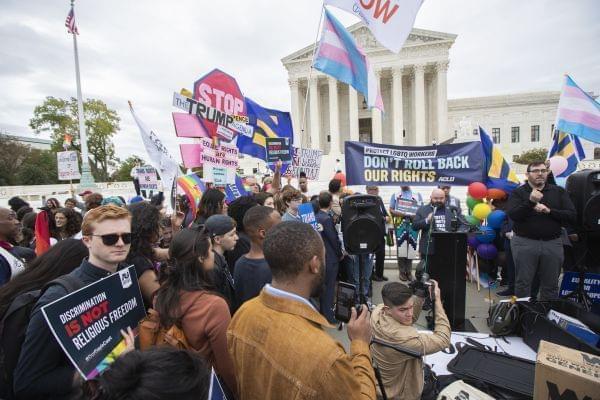LGBTQ Workplace Rights U.S. Supreme Court Case; Native Americans’ Role In The Underground Railroad; Black Girl Genius Week

LGBT supporters gather in front of the U.S. Supreme Court, Tuesday, Oct. 8, 2019, in Washington. Manuel Balce Ceneta/AP
Today, the U.S. Supreme Court will hear arguments about whether it’s legal to fire someone for being gay or transgender. Plus, Native Americans in the Midwest helped black men, women and children escape slavery through the Underground Railroad. We spoke about why that history is often overlooked. And, a Champaign-Urbana organization is celebrating its fifth annual Black Girl Genius Week through art, music and workshops.
LGBTQ Workplace Rights U.S. Supreme Court Case
Today, on the second day of its new term, the Supreme Court will hear arguments about whether or not it is legal to fire someone for being gay or transgender.
The issue is about the interpretation of Title VII of the Civil Rights Act of 1964. Title VII protects against workplace discrimination because of race, but also prohibits discrimination because of sex.
Illinois actually has workplace discrimination laws on the books already. In 2017, a federal judge in Chicago ruled that Title VII barred discrimination against gay employees.
So what does our experience here in Illinois tell us about what could happen at the Supreme Court? To learn more about this, we were joined by Camilla Taylor. She’s the director of constitutional litigation for Lambda Legal, an organization that has litigated similar cases in the Illinois Court of Appeals. Mike Ziri is a policy director for Equality Illinois, an LGBTQ advocacy group.
@MichaelZiri with @EqualityIll says a majority of states do not have explicit statewide protections - 21 states protect LGBTQ workers.
— The 21st (@21stShow) October 8, 2019
Native Americans' Role In The Underground Railroad
In the 1800s, thousands of black men, women and children tried to escape slavery by heading north, many of them through an organized network of safe houses and routes known as the Underground Railroad.
Many of those pathways to freedom cut right through the Midwest. We’ve talked on the show before about the different kinds of people who were part of this, whether it’s free black communities in southern Illinois, or white abolitionists at Wheaton College.
But Native Americans were also an important part of the Underground Railroad, and this history has been left out of the mainstream.
Roy Finkenbine is the director of the black abolitionist archive at the University of Detroit Mercy, where he’s also a professor of history.
William Swan was enslaved and ran away in 1861. He met a community called the Greensky Hill Indians.
— The 21st (@21stShow) October 8, 2019
"They help him basically carve a 16 acre farm out of the wilderness... his wife later will write just about how neighborly these folks are." - Roy Finkenbine
Black Girl Genius Week
For more than a decade, Saving Our Lives, Hearing Our Truths, otherwise known as SOLHOT has been celebrating and connecting Black girls and women through art, music and events.
This week, the organization will hold its fifth annual Black Girl Genius Week in Champaign-Urbana. Over the next few days, SOLHOT will host different events including artist talks, a yoga session and even a workshop on a style of hip-hop known as trap music.
Ruth Nicole Brown is an associate professor in Gender and Women’s Studies at the University of Illinois. She’s also the Public Voices Fellow for the Op-Ed Project and the founder of SOLHOT and Black Girl Genius Week. Jessica Robinson is a doctoral student in communications at the U of I and has been planning this year’s Black Girl Genius Week. Both of them joined us in the studio.
"The brilliance, beauty and also the chaos of what happens when we're face to face is what's really important when were talking about large concepts like beauty and youth culture." - @Illinois_Alma doctoral student, Jessica Robinson #SOLHOT #BlackGirlGeniusWeek
— The 21st (@21stShow) October 8, 2019

